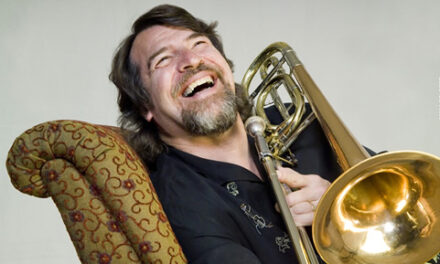Renowned American tenor Darryl Taylor sang songs to texts from two extraordinary American poets in a recital at the B.N. Duke Auditorium on the campus of NC Central University on the evening of January 13. The poets were Paul Laurence Dunbar (1872-1906), whose remarkable career from his birth to a poor but proud former slave to international acclaim was cut short by TB at the age of 34. The second poet, Langston Hughes, was in his time and is still today an eloquent voice for the hurts and longings of the American Black spirit.
In the first set of songs by Dunbar, composers Charles Neuschwanger and Adolphus Hailstork both tried their hands at setting the 1895 poem “Invitation to Love.” Both settings were solidly within the romantic tradition and treated Dunbar’s words affectionately and effectively. Love is invited to…
Come when my heart is full of grief
Or when my heart is merry;
Come with the falling of the leaf
Or with the redd’ning cherry.
Two other composers, George Walker and H. Leslie Adams, offered settings of the 1903 “Response.” Here again the settings were romantic in character, with melody and sweet harmony enriching the poet’s words.
With the juxtaposition of “A Death Song” and “Life,” the tenor had the opportunity to let loose a little more of his versatile and powerful voice. Howard Swanson’s setting of the former was rich in expressiveness, rather more whimsical than sad, given Dunbar’s dialect text: “Fu’ I t’ink de las’ long res’ Gwine to soothe my sperrit bes’ Ef I’s layin’ ‘mong de t’ings I’s allus knowed.” As if to underscore “de las’ long res’,” this selection ended with a sustained tone that was a test of breath and vocal control by Taylor that he certainly mastered beautifully. The setting of “Life” by Zenobia Powell Perry was a treasure to be savored. (Note to self and reader: Look for more music by this remarkable African-American woman. She died just a year ago at age 95, vigorous and active to the very end.)
Dunbar says life is…
A CRUST of bread and a corner to sleep in,
A minute to smile and an hour to weep in,
A pint of joy to a peck of trouble,
And never a laugh but the moans come double;
And that is life!
Taylor commissioned Edward Hart, of the College of Charleston, to compose an extended work using the poetry of Paul Laurence Dunbar, and this performance marked the world premiere of the resulting composition. Hart borrowed the title from Maya Angelou – The Caged Bird Sings. The group includes three songs by Dunbar – “We Wear The Mask” (1895), “Dreams” (1899), and “Sympathy” (1899) – scored for tenor, cello, and piano. Cellist Timothy Holley of NCCU joined Taylor and accompanist David Heid, of Duke. The first song expresses the hurt and anger the Black Man tried so hard to conceal for so long, using broken and choppy rhythms and sometimes harshly dissonant accompaniment. It is a tour de force for the composer and for the artists who performed it. The following two songs were equally expressive and impressive. This work has potential to become a major item in the repertoire of American art song.
After intermission, Taylor turned to the poetry of Langston Hughes, using a mixture of spoken texts and musical settings of mostly American composers. Of special note was Jean Berger’s setting of “Carolina Cabin” (1947), a paean to innocence, love, and simple country life, and “Lovely Dark and Lonely One” by Harry T. Burleigh, whom we know as a supreme arranger of spirituals. Burleigh here produced a beautiful and masterful art song setting of a haunting love song.
Taylor sang three of the five Hughes poems set to music by Southern California composer Richard Thompson. “I, Too, Sing America,” one of Hughes most assertive poems, was powerful. “Monotony” was anything but monotonous, with attention-getting dissonance, intriguing rhythms, and, soaring over all, a charming melody. “Dream Variations,” one of Hughes’ best-known poems, is in Thompson’s version at once haunting and uplifting:
To fling my arms wide
In some place of the sun,
To whirl and to dance
Till the white day is done.
Then rest at cool evening
Beneath a tall tree
While night comes on gently,
Dark like me —
That is my dream!
I must make note of the beautiful accompaniment of David Heid, which was sensitive and lyrical, matched the singer’s style, and was supportive and complementary throughout the program. Heid is a special treasure on the local scene.
Those who missed this outstanding program may wish to know that Taylor, Heid and Holley will repeat it in the A.J. Fletcher Recital Hall at ECU in Greenville on Monday, January 17 – see our Eastern calendar for the complete listing and performance details. In addition, many of the selections heard in the second half of the concert may be enjoyed on the Naxos recording Dreamer: A Portrait of Langston Hughes (catalogue number 8.559136), which features Taylor and, as an added bonus, the recititation of William Warfield – the last recording of his phenomenal voice just before his death in 2002.











